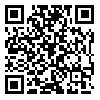Volume 30, Issue 2 (6-2024)
Back to this Issue |
Back to browse issues page
Download citation:
BibTeX | RIS | EndNote | Medlars | ProCite | Reference Manager | RefWorks
Send citation to:



BibTeX | RIS | EndNote | Medlars | ProCite | Reference Manager | RefWorks
Send citation to:
Aghajanzadeh Omrani E, Rahimaghaee F, Khalatbari A. The effectiveness of Mandala therapy in reducing rumination among medical science students. Journal of Hayat 2024; 30 (2) :153-162
URL: http://hayat.tums.ac.ir/article-1-5231-en.html
URL: http://hayat.tums.ac.ir/article-1-5231-en.html
1- Dept. of Clinical Psychology, School of Medical Sciences, Tonekabon Branch, Islamic Azad University, Tonekabon, Iran
2- Dept. of Nursing, School of Medical Sciences, Tonekabon Branch, Islamic Azad University, Tonekabon, Iran ,frahimaghaee@gmail.com
2- Dept. of Nursing, School of Medical Sciences, Tonekabon Branch, Islamic Azad University, Tonekabon, Iran ,
Abstract: (1023 Views)
Background & Aim: Rumination is a prevalent issue among medical science students, potentially affecting their academic performance. This study aims to evaluate the effectiveness of Mandala therapy in reducing rumination among medical science students at the Islamic Azad University, Tonekabon branch.
Methods & Materials: This quasi-experimental study employed a pre-test, post-test design with a control group. A total of 40 medical students from the Islamic Azad University, Tonekabon branch, who exhibited signs of rumination participated in the study in 2023. Participants were selected through convenience sampling and randomly assigned to either the experimental group (20 participants) or the control group (20 participants). The intervention consisted of four 60-minute sessions of Mandala therapy. Data were collected using the Nolen-Hoeksema and Morrow's rumination questionnaire. Descriptive statistics and analysis of covariance (ANCOVA) were performed using SPSS version 26 to analyze the data.
Results: Demographic analysis indicated no significant differences between the experimental and control groups concerning gender, age, or semester (P<0.001). The ANCOVA results revealed that the Mandala Therapy intervention significantly reduced the rumination scores of the experimental group compared to the control group (P<0.005).
Conclusion: The results suggest that rumination levels in the experimental group decreased significantly following the intervention compared to the control group. Therefore, Mandala therapy may serve as an effective non-pharmacological approach for mitigating rumination among medical science students.
Methods & Materials: This quasi-experimental study employed a pre-test, post-test design with a control group. A total of 40 medical students from the Islamic Azad University, Tonekabon branch, who exhibited signs of rumination participated in the study in 2023. Participants were selected through convenience sampling and randomly assigned to either the experimental group (20 participants) or the control group (20 participants). The intervention consisted of four 60-minute sessions of Mandala therapy. Data were collected using the Nolen-Hoeksema and Morrow's rumination questionnaire. Descriptive statistics and analysis of covariance (ANCOVA) were performed using SPSS version 26 to analyze the data.
Results: Demographic analysis indicated no significant differences between the experimental and control groups concerning gender, age, or semester (P<0.001). The ANCOVA results revealed that the Mandala Therapy intervention significantly reduced the rumination scores of the experimental group compared to the control group (P<0.005).
Conclusion: The results suggest that rumination levels in the experimental group decreased significantly following the intervention compared to the control group. Therefore, Mandala therapy may serve as an effective non-pharmacological approach for mitigating rumination among medical science students.
Send email to the article author
| Rights and permissions | |
 |
This work is licensed under a Creative Commons Attribution-NonCommercial 4.0 International License. |






